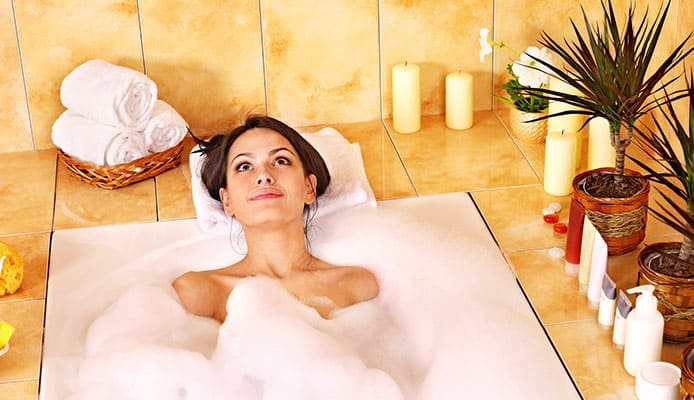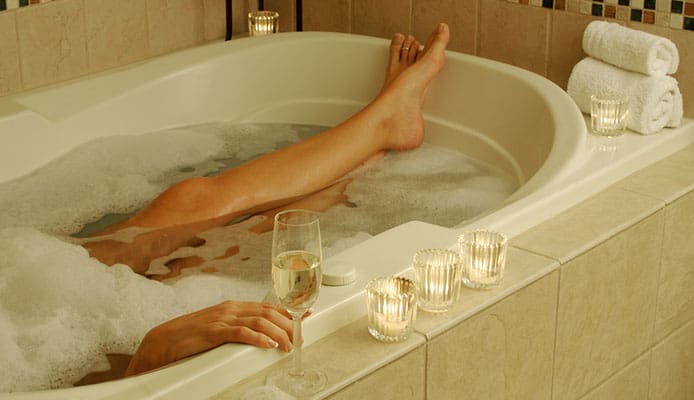
Epsom salt and hot tub are synonymous with general relaxation and pain relief for sore muscles and joints. This makes the idea of using Epsom salt in a hot tub appealing for most people. In most cases, however, using Epsom salt in the Jacuzzi is not a good idea – the idea can result in a ruined hot tub or you may end up with injuries.
In this article, we will help you understand why using Epsom salt in a Jacuzzi could cause more harm than good. We will also help you know when it is safe to put Epsom salt in the hot tub.
Reasons Why Using Epsom Salt in Hot Tub is Not Recommended
1. Chemical Reactions
Pure Epsom salt is an alkaline compound known as Magnesium Sulfate. The compound features mildly acidic properties that can easily disrupt the pH balance of the water in your hot tub. Unbalanced hot tub water may launch other issues, including corrosion of the hot tub equipment (gaskets, seals, plastic pieces, metal parts, etc.) and reduced performance of the hot tub sanitizer.
One of the commonly used hot tub chemicals is chlorine. Magnesium and chlorine should never be mixed – a reaction between the 2 compounds can cause flash burns. If you add Epsom salt to a chlorinated hot tub, your chances of ending up with serious injuries (from the flash burns) will be very high.
2. Epsom Salt Increases the Total Dissolved Solids
Epsom salt is commonly used in regular bathtubs. When being used in the bathtub, the standard recommendation is adding about 2 cups of Epsom salt to enjoy the full therapeutic effects.
On average, bathtubs hold approximately 80 gallons of water. Standard hot tubs, on the other hand, hold between 400 and 500 gallons of water. To reach the same concentration in the hot tub, you will need to add 10 to 12 cups of Epsom salt – this is a lot of solids.
Bathtubs are extremely easy to drain and are usually drained regularly. Unfortunately, hot tubs are usually not drained as easily or as often as the bathtubs.
To prevent scale buildup in the hot tub surfaces and equipment, hot tub manufacturers recommend draining a hot tub when the level of the Total Dissolved Solids reaches 1,500 ppm. Failing to do so can easily void your warranty.
Using Epsom salt in a hot tub by adding 10 to 12 cups can quickly raise the Total Dissolved Solids, reaching far past the recommended maximum threshold of 1,500 ppm. Although the hot tub heaters usually sustain the most damage from the scale buildup, jets, pool pumps, tub surfaces, and water lines can also accumulate scale if you fail to maintain an ideal water balance.
You Can Use Epsom Salt in Jacuzzi If It Has Plain Water
If you are willing to drain your hot tub more often, you can use Epsom salt in a plain water hot tub. Since there is no chlorine in the plain water, the Epsom salt will not cause any injuries. To avoid adding too much Epsom salt and causing corrosion to the tub equipment, only add the amount recommended by the manufacturer.
Alternatives to Using Epsom Salt in Hot Tub
Epsom salt features numerous health benefits. In addition to helping with stiff joints, muscles, and tendons, it can raise the body’s magnesium levels. Higher magnesium levels can improve heart health, aid in flushing out toxins, and improve the body’s insulin use.
To enjoy these benefits, however, you do not have to add pounds of Epsom salt to your hot tub, risking long-term damage to the hot tub, plumbing, and equipment. You can try other alternatives that offer the same benefits. Epsom salt alternatives include:
Hot Tub Aromatherapy Products
Most hot tub aromatherapy crystals use Magnesium Sulfate (Epsom salt) as a primary ingredient. The key difference is that they are specially formulated for use in spas and hot tubs. Smaller quantities are required to achieve the same effect and the crystals will not cause problems with the hot tub equipment or alter the water chemistry.
The hot tub aromatherapy crystals are formulated with minerals, natural herbs, moisturizing nutrients, vitamins, and more. These ensure that you get the maximum health benefits in the hot tub.
You might also like: Hot Tub Sanitizers
Hot Tub Elixirs
You can also use elixirs instead of putting Epsom salt in Jacuzzi. Hot tub elixirs can help you relax while moisturizing the skin and softening the water.
Hot Tub Bombs
The hot tub bombs feature the same benefits as the bath bombs. However, unlike the bath bombs, they will not clog up the hot tub filter or alter the water chemistry.
FAQs

Q: Can You Use Epsom Salt in A Hot Tub?
Yes, you can use Epsom salt in the hot tub. However, you have to be cautious in order to avoid damaging the hot tub or getting injured. To avoid injuries, use Epsom salt in a hot tub that has plain water. Adding Epsom salt in chlorinated hot tubs can cause serious injuries.
To avoid scale buildup, you have to drain and clean the hot tub regularly. Also, use the amount of Epsom salt recommended by the manufacturer to prevent corrosion.
Q: Can You Use Bath Salts in A Jacuzzi Tub?
Bath salts can be used in the Jacuzzi tub. However, you have to use plain bath salts that do not contain any added oils. The reason you should avoid salts featuring added oils is that the oily residues can cause bacterial growth, clog the intake valves and inner plumbing, and damage the pump.
Q: Is It Good to Put Epsom Salt in Your Bath?
Putting Epsom salt in your bath is a good idea. It can relieve pains & aches and also elevate your magnesium levels.
Q: Will Epsom Salt Damage an Acrylic Tub?
Epsom salt will only damage your acrylic tub if left on the surface for extended periods. To make sure that Epsom salt does not damage your Acrylic tub, clean the tub with soap and water to make sure that no residue is left on the tub’s acrylic surface.
Q: Is Epsom Salt Bad for Your Plumbing?
Prolonged plumbing exposure to high concentrations of Epsom salt can cause damage. However, when used correctly, Epsom salt will not harm your plumbing. This tells you that you do not have to worry about your occasional salt-bath additives going down the drain.
Globo Surf Overview
Using Epsom salt in the hot tub can cause damage to the hot tub and injuries if your hot tub contains chlorinated water. This suggests that you should try to avoid using magnesium sulfate in the hot tub.
However, if you still want to try adding Epsom salt to Jacuzzi, ensure that you have plain water in the hot tub. Also, drain and clean the hot tub thoroughly after you are done soaking.

